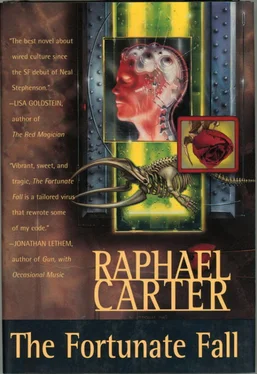Raphael Carter - The Fortunate Fall
Здесь есть возможность читать онлайн «Raphael Carter - The Fortunate Fall» весь текст электронной книги совершенно бесплатно (целиком полную версию без сокращений). В некоторых случаях можно слушать аудио, скачать через торрент в формате fb2 и присутствует краткое содержание. Город: New York, Год выпуска: 1996, ISBN: 1996, Издательство: Tor Books, Жанр: Киберпанк, на английском языке. Описание произведения, (предисловие) а так же отзывы посетителей доступны на портале библиотеки ЛибКат.
- Название:The Fortunate Fall
- Автор:
- Издательство:Tor Books
- Жанр:
- Год:1996
- Город:New York
- ISBN:0-312-86034-X
- Рейтинг книги:3 / 5. Голосов: 1
-
Избранное:Добавить в избранное
- Отзывы:
-
Ваша оценка:
- 60
- 1
- 2
- 3
- 4
- 5
The Fortunate Fall: краткое содержание, описание и аннотация
Предлагаем к чтению аннотацию, описание, краткое содержание или предисловие (зависит от того, что написал сам автор книги «The Fortunate Fall»). Если вы не нашли необходимую информацию о книге — напишите в комментариях, мы постараемся отыскать её.
“Gripping…. One of the most promising SF debuts in recent years”.
—“Publisher’s Weekly” starred review
The Fortunate Fall — читать онлайн бесплатно полную книгу (весь текст) целиком
Ниже представлен текст книги, разбитый по страницам. Система сохранения места последней прочитанной страницы, позволяет с удобством читать онлайн бесплатно книгу «The Fortunate Fall», без необходимости каждый раз заново искать на чём Вы остановились. Поставьте закладку, и сможете в любой момент перейти на страницу, на которой закончили чтение.
Интервал:
Закладка:
I was sitting on the floor, all thought of argument or violence long forgotten. I could only brace myself against the next attack, and hope that Keishi would come soon.
“TWENTY-FIVE PERCENT.”
(Toward the end, she would spend hours at a time in the Net without me, reinforcing the walls of our hiding-place. She would sit at the kitchen table, bent over a black box, both her wrists and both her temples cabled into it. And I would sit with a washcloth and a bowl of lukewarm water, and from time to time blot the beads of sweat from her face. Now, remembering, I was filled with the desire to see that face, to remember what she looked like. But even in its death throes, the suppressor chip still disheveled my thoughts, replacing the face that I wanted to see with Keishi’s.)
“TEN PERCENT,” the bird said. Africa, green and dying, boiled between his palms. Osiris was torn and made whole. It was coming.
“NINE”: (I had come home with my groceries, but she was still out getting hers. We always shopped separately) “EIGHT” (lest someone should notice us buying for two. She was late, so I stood at the edge of the window to watch for her. I peered around the edges of the blinds, seeing, but unseen. At last I saw her) “SEVEN” (coming down the sidewalk, a paper bag cradled in each arm. I watched her sleepily, trying to decide whether to drink the cup of coffee I was balancing against my collarbone, or just break down and take a nap. The smell of the coffee was persuasive but the nap, too, had its) “SIX” (attraction. Yes. I would lie down, just for an hour, and she would kiss my cheek to wake me—
Something was happening.) “FIVE.” (She had changed course, looking out into traffic for a chance to cross the street. A figure in black called out. I couldn’t quite hear what he said.) “FOUR.” (She followed him into the doorway of our building, out of sight. I searched in the windows across the street, and at last found her reflection. She was lowering her sacks to the ground with the exquisite slowness of someone who knows she’s in gunsights.
“Take out your Net chip,” said the videophone. Her voice— Keishi’s voice.
“Don’t do it,” I pleaded. “You’ll never make it—”
“!take.out(it 2)!”
And I took it out, knowing what she would do and what would happen to her when she did.) “THREE.” (She had spent too much time on the Net, where no situation is ever quite hopeless, and where one person, wired right, can stand firm against a thousand. But I, who had stayed behind to sponge her brow with water, still remembered the inevitability of the flesh.)
“TWO.”
(And in the windows across the street, I saw her take a wine bottle from the sack and break it across the Postcop’s face. Diving into the doorway, she clapped a black chip to her head, and half the people walking down the street staggered and fell. Cars caromed like billiard balls. She crashed up the stairs—she was at the door—she opened it.) “ONE PERCENT.” (And as she crossed the room, a man in black was watching from the roof across the street. A Weaver had possessed him; you could see it in his eyes. He looked down along the barrel of his rifle, like one who cocks his head in thought; paused a moment; then lifted his head again and nodded slightly, as though the thought were now complete. A smooth circular hole had been punched in the front window, and another in the wall behind, and between them she lay with a hole the same size in her temple, already dead.)
“ZERO.”
(I did not go to her. If I had warned her, it would not have helped; if it had not been him, it would have been some other; she had been dead the moment she reached into the sack, no, the day she departed for Zanzibar. And so I did not call out to her, though I had seen the man gone Weaver on the roof from the beginning, lifting his gun to his shoulder, and carefully taking his aim.)
Nineteen
ORPHEUS
I stayed there as long as I could, in that time when she had just now fallen. She might yet live. She might yet shake her head and rise. The stain of blood spreading out from her temple might be nothing more than a lengthening shadow, cast by the setting sun.
But that sun had set, and twenty years of suns. I must step up out of the sunken garden of the past into this present, where she had been twenty years dead. She lay now in some secret grave, abandoned, with no flowers and no tombstone to mark the spot. If any trace remained of her at all, it was only a blaze of deep green in some field of withered grass, and I would never find it.
I hadn’t known. I had remembered so little. The cable inside my head, scraping and scraping. The drug that burned the sex out of my body, as I vomited into the drain in a holding cell for thirty hours. And I’d remembered saying that I would do whatever they asked of me. I would tell them everything, I would reveal every shared secret and betray every confidence. And then I would forget it all, and leave the station as a person who had never been in love. And remembering how quickly I had agreed to forget, I had assumed some series of casual liaisons, lightly entered into, and lightly abandoned. Now I knew the full extent of my betrayal. I had been the only one to remember her, and I had given it up, not after a fight, but readily. I was not the person I had thought I was; and tears fell like scales from my eyes.
“Desuppression complete,” the god said. “If you would like to discuss any of our fine moistware products, I am always at your service.” He folded Africa into his hands, and he was gone.
“The recording of your desuppression is already being distributed,” Voskresenye said. “In the days to come, as the Weaver viruses are defeated, others of your kind will appear. You have struck a blow for them. Because of what you did today, there may yet come a time when they no longer have to hide.”
I had recognized her. They had tried to tear her out, but she had lived in me—deep in my heart and secret, nameless and indescribable, yet never entirely gone. She had been a face in the window of every departing train, a form seen from the back on every crowded street, always just out of my sight, always turning away. And I had known her when she came to me, though I could not say it, and though the very thought had sent my mind skidding across the ice into unconsciousness.
I took the camera chip out of my head. “What,” I said, fighting to keep my voice steady “—what is Keishi Mirabara?”
“Ah!” Voskresenye laid a finger along his nose. “Not ‘who,’ but ‘what’! Very impressive! I had not expected you to guess so much so quickly.”
“Don’t critique the question, you son of a bitch, just answer it. Did you create her? To seduce me? To get me here?”
“How Manichaean of you, Andreyeva. I did not create her; that is Someone Else’s job. I merely found her and made use of her.”
“You’re lying,” I said. “She’s not real. She doesn’t exist at all.”
“Oh, but I do, Maya,” Keishi said. She was leaning against the doorframe. She had restored the face I had seen in my memories, the face she’d had before she disguised herself as Japanese and then as Japanese Black. She was dressed all in white, and she shone like the sun, which was the least of the reasons that I found it hard to look at her.
“So what’s the joke, revenant?” I said, my whole face aching from the effort to hold back tears. “Did he make you? Are you a Postcop?”
“No, and no.” She looked behind me at the tank where the whale floated aimlessly, her wings gently stirring the water. “I’m her,” she said, nodding toward the whale. “Part of her. And I am the woman that you loved, twenty years ago.”
“Can’t you come up with a better lie than that? She’s dead. I saw it happen.”
Читать дальшеИнтервал:
Закладка:
Похожие книги на «The Fortunate Fall»
Представляем Вашему вниманию похожие книги на «The Fortunate Fall» списком для выбора. Мы отобрали схожую по названию и смыслу литературу в надежде предоставить читателям больше вариантов отыскать новые, интересные, ещё непрочитанные произведения.
Обсуждение, отзывы о книге «The Fortunate Fall» и просто собственные мнения читателей. Оставьте ваши комментарии, напишите, что Вы думаете о произведении, его смысле или главных героях. Укажите что конкретно понравилось, а что нет, и почему Вы так считаете.












